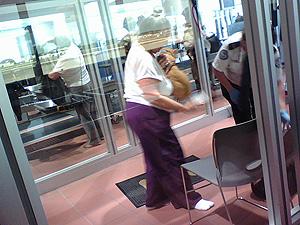Airline security list backlash
A woman being searched at an airport security checkpoint. (Image by Flickr user The Consumerist (cc: by-nc-sa))
This story is adapted from a broadcast audio segment; use audio player to listen to story in its entirety.
Air travelers from any of 14 countries specified by the Obama administration will be subjected to extra security procedures if they wish to fly into the U.S. This measure is a direct response to the alleged Christmas Day almost-bomber, Umar Farouk Abdulmutallab, who failed in his attempt to blow up a Northwest Airlines flight from Amsterdam to Detroit.
The countries on the list are Cuba, Iran, Sudan, Syria, Afghanistan, Algeria, Iraq, Lebanon, Libya, Nigeria, Pakistan, Saudi Arabia, Somalia and Yemen.
Washington correspondent for “The New York Times,” Eric Lipton, has been following these developments and he says that many of the countries are accusing the United States of racial and ethnic profiling, and calling it unfair.
But the Transportation Security Administration has imposed the new regulations on airlines flying into the US, says Lipton. “It essentially told them that if you want the privilege to fly into the United States, anytime that you have a passenger that boards your flight from any of these 14 countries, that individual must be patted down, and their carry-on bag must be double checked — usually at the gate — before they enter the plane.”
Those who are citizens of any of the 14 countries, as well as anyone who has taken a flight that originates from, or passes through those countries, are subject to the mandatory additional screening.
Lipton says representatives from a few of those 14 countries on the security list consider it offensive that the US now considers all of their citizens suspects.
The list has two categories: The “state sponsors of terrorists,” which include countries like Iran, Cuba and Sudan; and “countries of interest,” which are countries that are somehow linked with terrorist groups like al-Qaida. How a country gets on the latter list is a bit vague says Lipton.
Nuala McGovern, host of the BBC’s global call-in and interactive radio show, “World Have Your Say,” posed this question to her audience: “Can profiling stop terrorism?” The responses she got were overwhelming.
“One of the really interesting points that came up … was this whole idea of a substitution strategy,” said McGovern. “And what that means really is if you profile certain nationalities or a certain group of people, will the people who are then trying to commit terrorist acts then just go to a different group, to someone who you are not trying to profile?”
Along with comments about profiling, quite a few people also shared their experiences with the security searches they endured at airports.
“The searches are a big part of it,” said McGovern, “The one thing is, the Nigerian would-be bomber last week, even if he had the full pat-down … that they’re now brining in, it still wouldn’t have detected the bomb.”
“Should the argument be more towards searches instead of profiling a certain nationality?” McGovern added.
“The Takeaway” is a national morning news program, delivering the news and analysis you need to catch up, start your day, and prepare for what’s ahead. The show is a co-production of WNYC and PRI, in editorial collaboration with the BBC, The New York Times Radio, and WGBH.
Every day, reporters and producers at The World are hard at work bringing you human-centered news from across the globe. But we can’t do it without you. We need your support to ensure we can continue this work for another year.
Make a gift today, and you’ll help us unlock a matching gift of $67,000!
